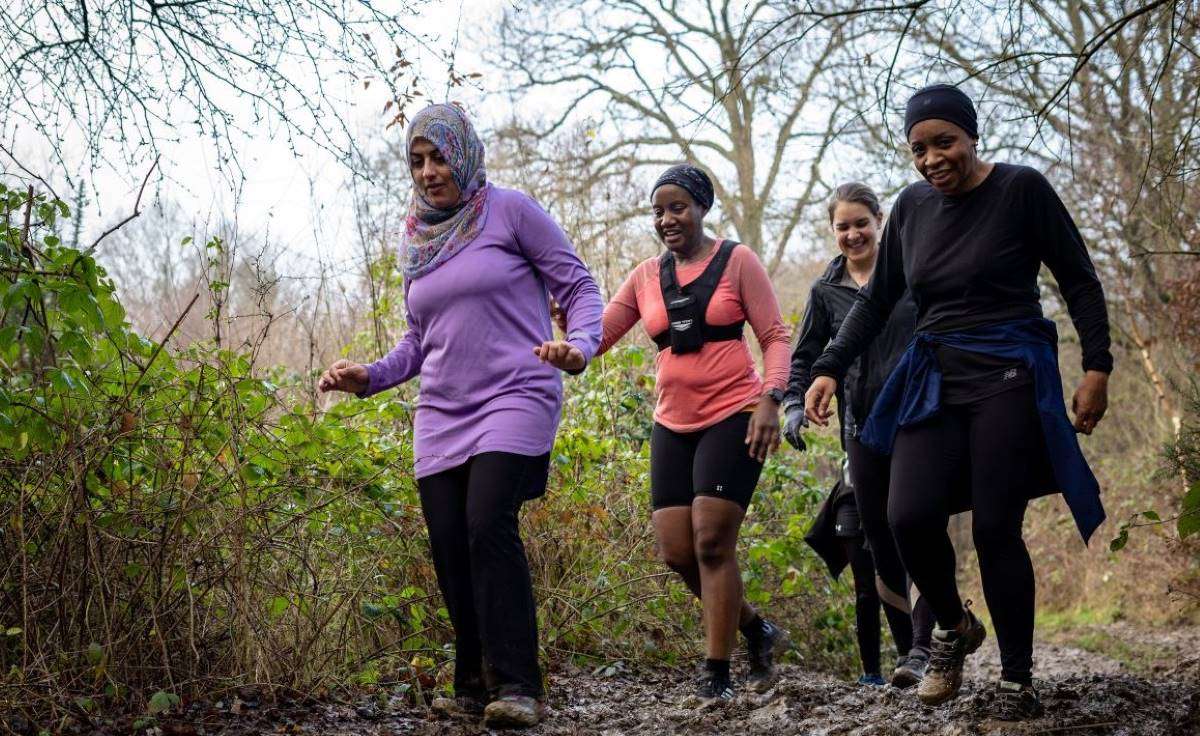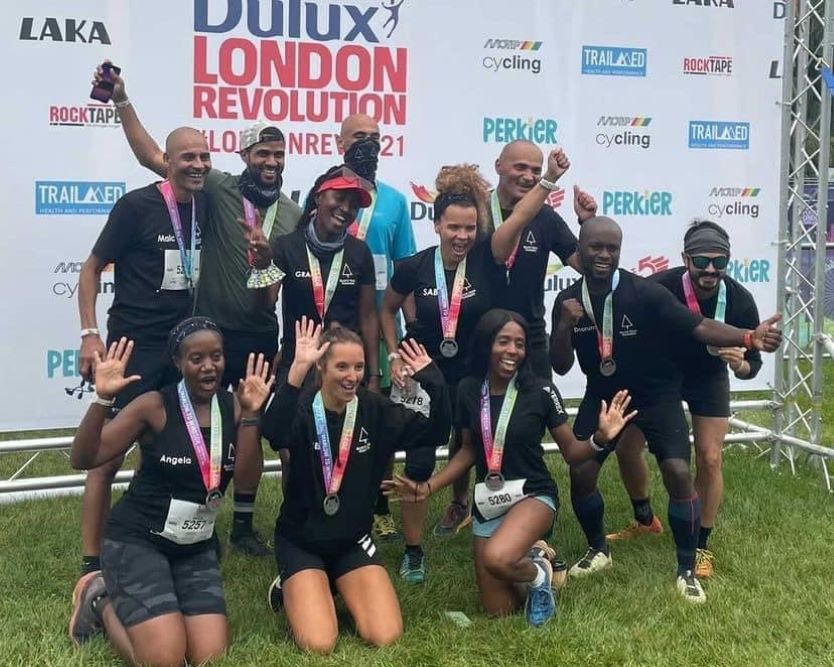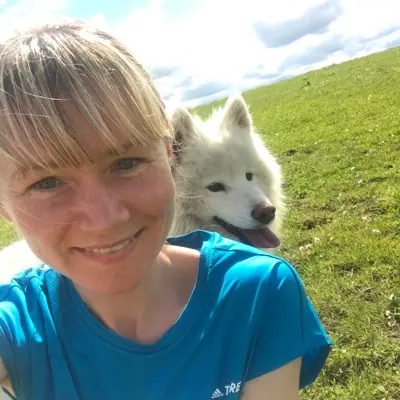Black Trail Runners is not just a running community — it is a movement. Its simple aim, to increase diversity and the inclusion of people of different ethnicities in the sport of trail running, has resonated on a deeper level with so many of the runners and supporters who have connected with it.
The U.K.-based voluntary organization uses donations to put on “trail taster” events, and to provide free transport to the trails and other supports — thus aiming to remove some of the barriers and make trail running more accessible for a wider community. They also organize social runs, led by qualified run leaders, at different locations throughout the U.K.
Sonny Peart is co-founder of Black Trail Runners, and he described how the idea was borne out of a conversation had during the first COVID-19 lockdown of 2020:
“Two years ago, we were in lockdown and lots of races were canceled and a friend of mine, James Elson, race director of Centurion Running, had nothing else to do so he was doing podcasts instead of organizing races. He invited me to go onto his podcast to talk about a couple of things, including the fact that during his 10 years of race directing, he could count the number of Black runners in his events on one hand.
“He was interested in why that might be and whether that was my experience as well. In the course of that discussion and preparing for it, it became clear to me that he was right, that this was a sport in which Black people were very underrepresented.”
When aired, the podcast was well-received and led to a wider conversation between Peart and others who were interested in promoting diversity in the outdoors, and they reached the shared conclusion that they should try to do something about this disparity. A group of eight formed, including Peart and Dora Atim, Marcus Brown, Rachel Dench, Martin Johnson, Sabrina Pace-Humphreys, Donna Richards, and Phil Young.
Peart said, “We decided to kick off by writing to race directors in the U.K. and asking them to collect ethnicity data, because what we realized was that while event organizers were collecting data on age and gender, no one was collecting data on ethnicity, so no one really knew what the real picture was. We had anecdotal evidence because we would often be the only person of color in an event, but no one really knew.
“We got a mixed response to that, but many race directors did respond and start collecting that data and we found fairly quickly that, while Black people in the U.K. are about 4.5% of the population, they were less than 1% of race entries in trail races. So, it was quite a significant gap.”
Identifying the Barriers
The group set about trying to ascertain some of the reasons for the absence of Black runners on the trails and found that there were geographic and economic barriers.
“It’s widely shown that on average Black people are poorer than white people in the U.K. and trail running is not the cheap, low-cost sport many people imagine it to be. Certainly, if you want to compete at the sharp end, it’s really expensive. In terms of geography, for historical reasons, Black people in the U.K. are overwhelmingly concentrated in urban areas, and trail running obviously takes place in rural areas. And it costs money and time to get to these places.”
As a continuation of this, Peart and the others identified that people who had grown up in urban areas might lack some of the skills and knowledge needed to safely take to the trails. It was with all of the above in mind that the group first came up with the idea to host trail taster events. The events were free, held close to urban centers where many Black people lived, and where necessary, free transport was provided to take people to and from the event.
The trail tasters incorporated not just a group run, but also talks and workshops on areas such as equipment or navigation, to provide aspiring trail runners with the knowledge and skillsets needed to confidently take their place on any start line.
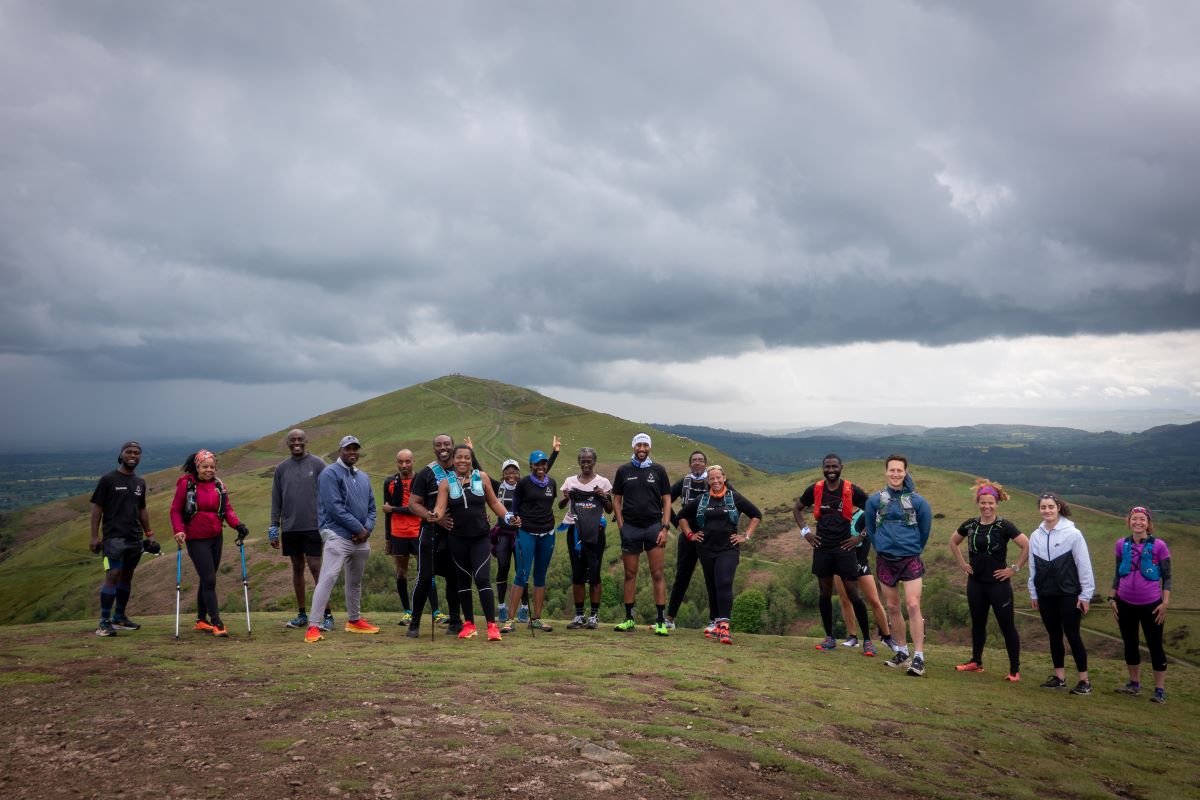
A Black Trail Runners trail taster event in the Malvern Hills, England. Photo courtesy of Sonny Peart.
The Need for Representation
After the above-mentioned barriers, another obstacle that Peart and the others identified was the lack of representation and role models for runners of color.
He said, “What we saw and what we have experienced very regularly was Black people weren’t represented in the marketing of the sport, weren’t portrayed by event organizers and the media. It’s possible to pick up a trail running magazine and not see a single Black person included — the same with websites of trail events. While that doesn’t stop people from doing things, it does nothing to encourage them.”
This lack of representation has encouraged many members of Black Trail Runners to be the change they want to see in the world. One such runner is accomplished trail runner Inein Garrick, who lives in Wales. He says, “It’s important for each and every one of us to play our part by showing up for races, because you can’t be what you can’t see. If I go to a race and I end up in a picture or a video, someone might see that and think, Oh there’s someone who looks like me, maybe I can do it.”
Garrick stumbled upon the Black Trail Runners Facebook page during lockdown in 2020. He attended the first trail taster in early 2021 in Worcestershire. Black Trail Runners co-founder Sabrina Pace-Humphries spoke and Garrick said, “She spoke so powerfully. She could convince anyone they can do anything!”
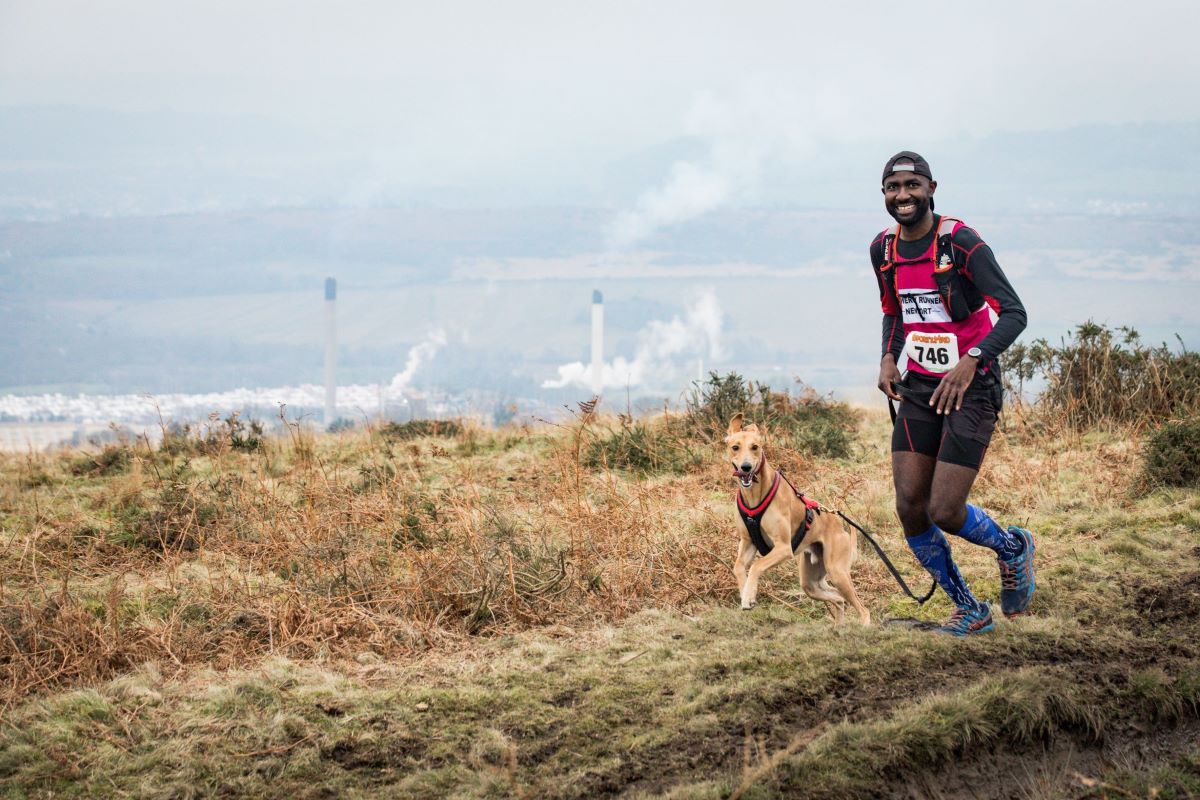
Inein Garrick running with his dog Zuko in the Red Kit Trail Canicross race. Photo courtesy of Inein Garrick.
After the first taster weekend, Garrick took the plunge and signed up for his first ultramarathon, Race to the Stones, organized by Threshold Trail Races. He is now an ambassador for the Threshold Trail Series, and this year he won two of their events — the 53k Race to the Stones ultra and a trail marathon, Race to the Tower. Threshold Trail Races have developed strong links with Black Trail Runners and share their ethos of making trail running and ultrarunning more inclusive and diverse.
For Garrick, Black Trail Runners is about a lot more than running, and its cause and mission go much deeper. He said, “For me personally, it really motivated me to challenge injustice and lend my voice to right and just causes.”
About the need to lead the way and inspire others, he said, “Personally, I love showing up because I’m not just modeling it for others but for my kids too. It’s important for me that my kids know that they are welcome in any space. And I have no worries or no doubts that they will feel like they don’t belong in this space, because their father is in this space so why can’t they.”
Lisa Arscott, a run leader and run coach from Birmingham, England, described one of the first ultra-trail events she attended, saying, “I was so shocked, because there were 1,000 runners and I only saw four people of color and they were my friends.” This served to strengthen the resolve of Arscott and her friends to keep showing up.
She said, “It’s really important for people from minority groups to see that there is a representative and someone who looks like them. Even if you’re not running you can still go and support.”
Arscott was already an experienced road runner when she found the trails through Black Trail Runners and she said, “It absolutely changed my life.” Arscott became a prolific ultrarunner just months after that first life-changing trail run.
Like Arscott, Angela Tomusange had been road running for some time before discovering Black Trail Runners. She values the group for the support network and also said. “When you see people that look like you doing more challenging events, it makes you think you can too.”
Not long after attending her first trail taster she also took on her first ultra, with the encouragement of Black Trail Runners co-founder, Sonny Peart.
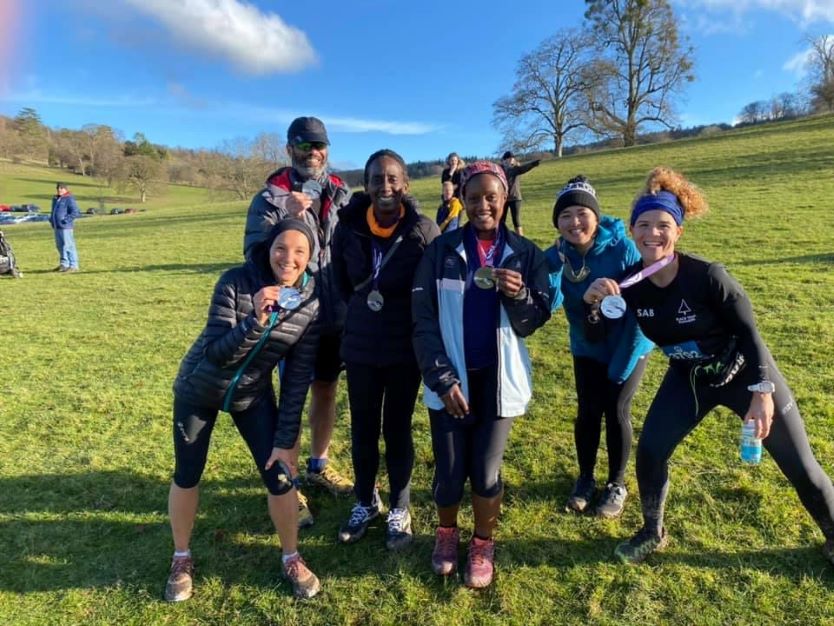
Members of Black Trail Runners at the finish of the Maverick adidas Terrex Trail Race. Photo: Angela Tomusange
The Speed Project
As well as becoming regulars at U.K. races and other events in Europe, Black Trail Runners have gone on tour to the USA, recently sending a team to represent them at the unsanctioned 340-mile relay race, The Speed Project, which runs from Los Angeles to Las Vegas, in March 2022. The organization provides a suggested route, but teams are free to make their way via the route of their choosing.
The team of six completed the event in three-and-a-half days. Jazmin Cole was one of the runners on team Black Trail Runners and she said, “I met one team member prior at one of the taster sessions and everybody else, I met at the airport! It was a very intense bonding experience — we all saw each other at our lowest!”
Cole talked about the impact Black Trail Runners is making and how being part of a wider community helps her to feel comfortable straight away when showing up to race. She said, “I ran a Threshold trail race last year. I was still quite new to trail running and when I turned up there were loads of people from Black Trail Runners. And straight away I was like, ‘Oh, I can talk to these people!’”
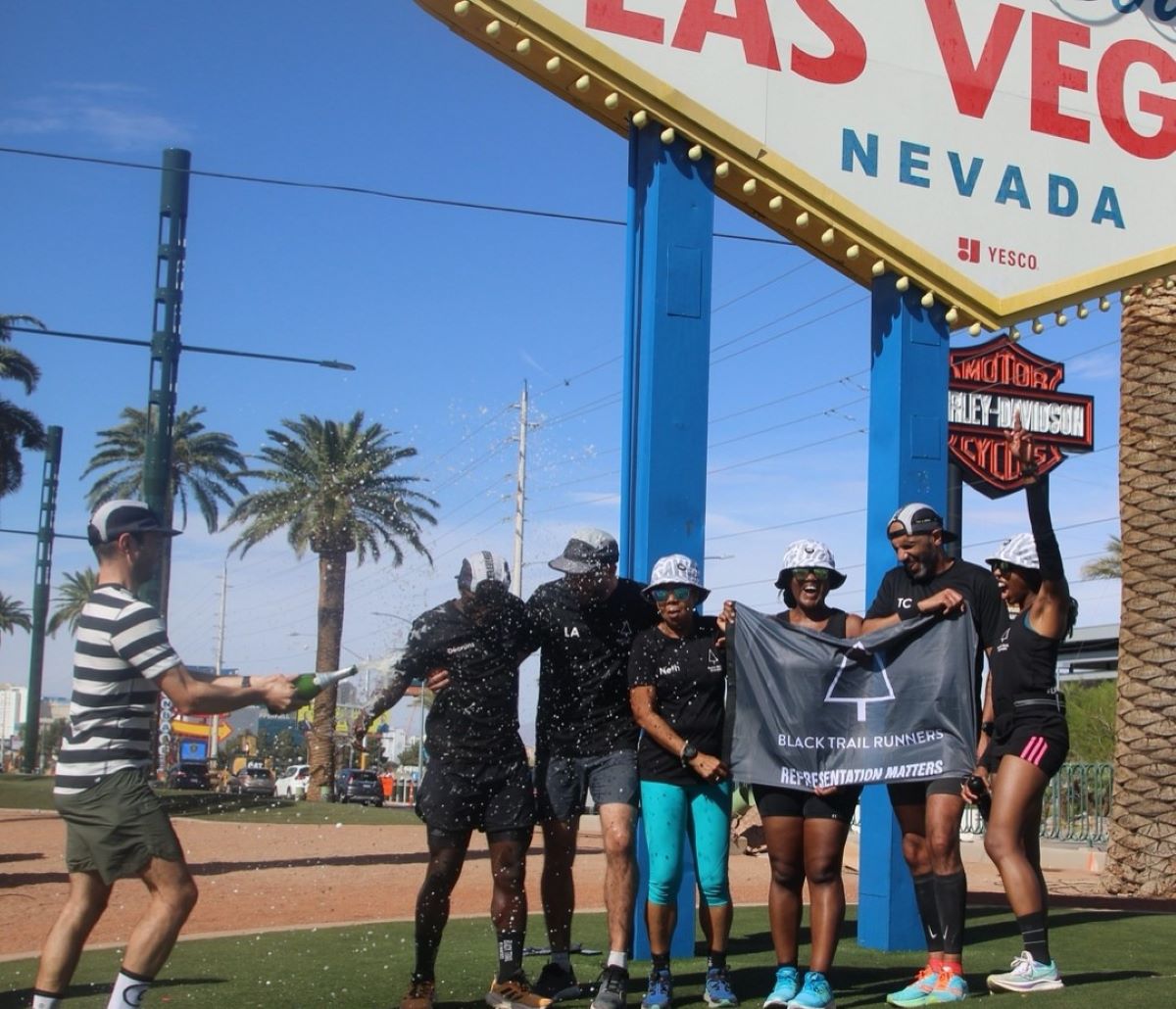
Team Black Trail Runners in Las Vegas at the finish of The Speed Project. Photo courtesy of Jazmin Cole.
In a relatively short timeframe, the Black Trail Runners community has grown exponentially. Their Facebook group now has more than 800 members, their Strava club has more than 5,000 members worldwide, and one of their Strava challenges last year had over 130,000 participants.
A Growing Movement
Peart said, “It’s caught a bit of a wave, it’s certainly taken off way beyond what we expected. I don’t think we really had a clear idea of what would happen, we just wanted to do something. So now we’ve got thousands of community members, running activities taking place around the country, we’ve got the support of brands and events.”
This autumn, Black Trail Runners are hosting their first trail race event, called Black To The Trails. It will be the first such event in the U.K. to be organized by Black people, and it will be the most diverse trail running event in the U.K. The race is open to everyone, and of the 250 runners registered, 70% are people of color. The event is aimed at beginners and includes a 1-kilometer, 5k, and 10k race, with many junior runners taking part in the shorter distances.
As the organization expands, it also aims to become more structured. Peart said, “We’re about to hire some part-time run leaders in London, Birmingham, and Bristol who’ll be paid.” About the group runs, which are currently taking place in locations throughout the U.K., Peart said, “People know that that’s a space they can feel safe in, they don’t have to justify themselves or feel uncomfortable.”
The organization also runs a popular podcast called The Checkpoint, where they’ve talked to a variety of guests, including U.S. ultrarunner Coree Woltering, who are interested in talking about running and inclusion more generally.
Two years on, what started out as a conversation has gone on to change the lives of many and the very make-up of the trail running and ultrarunning community, with Black Trail Runners leading the way.
Call for Comments
- Have you ever run with Black Trail Runners?
- Do you know of similar groups elsewhere in the world?
